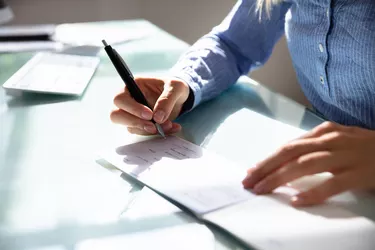
You may as well have found a bundled-up roll of cash in a parking lot. This is what coming across an old check, made out to you, that you completely forgot about, can feel like: Finding "free money," even if you worked for it. But don't dash to the bank to cash that check just yet. Most checks have "expiration dates," and if the date on your newly rediscovered check is long past, it's possible that you may never see the money. If the experience imparts the value of cashing checks promptly, banks would agree that it's a valuable (but costly) lesson learned.
Most Checks Are Void After 180 Days
Video of the Day
In general, business, payroll and personal checks are good for six months, or 180 days, The Huntington National Bank says. Your check may even have the words "void after 180 days" printed in small type toward the bottom, though some business checks include the phrase "void after 90 days" instead. Call it a warning or call it an inducement, but the language is designed to encourage people to cash or deposit checks as soon as possible to avoid three potential risks, Stilt says:
Video of the Day
- The account of the entity that wrote the check has closed, meaning the check will bounce.
- Insufficient funds are available in the account, also meaning the check will bounce.
- A stop payment has been placed on the check, often because the payee suspects the check has been lost.
The 180-day rule, which is a fairly universal practice spelled out by the Uniform Commercial Code, can mitigate these risks. The code is a collection of regulations that breed consistency among banking practices across the United States, no matter where people live. Banks are under no obligation to cash business or personal checks that are more than six months old. But they may acquiesce if they have reason to believe they will collect their money from the issuing bank, Bankrate says. If you find yourself in this situation, call your bank and ask about its policy. If it stands firm on the 180-day rule, you'll have no choice but to call the person or business that wrote the check and ask for a new one to be issued in your name.
Most Checks Expire
The 180-day rule may be the most common check-cashing rule, but it doesn't apply to all types of checks. You might have a cashier's check, money order, state check, traveler's check or U.S. Treasury check. In this case, it should be helpful to know that:
- Cashier's checks are usually used for large transactions like cars and houses and so are presumably cashed promptly. But not always. Some people assume that cashier's checks never expire, but since they're backed by the paying bank, it's up to this bank to decide if the check expires after 60, 90 or 180 days. If deadline language doesn't appear on the check you've found, call the issuing bank and ask how to go about getting your money.
- Money orders serve as substitutes for checks and are often used for transactions of low value. In general, they don't expire, though international money orders can. Eventually, so much time may pass that a money order is deemed "abandoned" or the issuer may start charging fees against it. It's best to contact the issuer and get direction about how to cash it.
- State checks are governed by state law, which varies from state to state but generally says that checks must be cashed in six months to a year. If you've found an expired state refund tax, call your state comptroller's office to request a replacement check.
- Traveler's checks never expire. They are a cash equivalent and so can be used for local purchases (at least in places where they're accepted).
- U.S. Treasury checks expire one year after the date on the check. It's still your money, and you're entitled to it, but you'll have to contact the U.S. Treasury to get a new check.
Check First So You Can Cash Later
The UCC doesn't address "banking etiquette," but maybe it should. Bankrate makes a sensible point if you've found a business, payroll or personal check that has been sitting around for a while – maybe not for six months, but at least for several months after the issue date: Call the person or business before heading to the bank to give them a heads-up about your intent.
With personal checks especially, it's possible that there is no longer enough money in the account to cover the check. Or (remember those three potential risks) the person may have switched banks. A courtesy call (or email) will spare you and the other party potential embarrassment. While it may be awkward for you to admit that the check was temporarily misplaced, the feeling will pass. Plus, your foresight could also give the other party the opportunity to ask whether they can write a new check.
After navigating the rules of check cashing, you just might feel as buoyant as you would after finding a bundled-up roll of cash once the check clears.